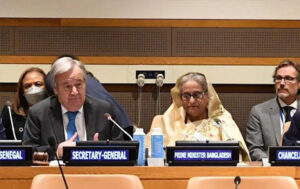 Moon Desk : Prime Minister Sheikh Hasina has stressed the need for strong political commitment and global solidarity in finding ways to overcome the crises caused by Ukraine war that has rattled the global economy and added fresh challenges to Covid-19 recovery and SDG implementation process, reports BSS.
Moon Desk : Prime Minister Sheikh Hasina has stressed the need for strong political commitment and global solidarity in finding ways to overcome the crises caused by Ukraine war that has rattled the global economy and added fresh challenges to Covid-19 recovery and SDG implementation process, reports BSS.
“We do need to find ways and means to bring an amicable end to this blood soaked, disastrous crisis. The sanctions and counter sanctions are deeply hurting people around the globe, more so, those in the countries at direct conflict, and those in the developing and least developed world,” she said.
The Prime Minister on Thursday said this while placing a six-point proposal to put an end to the war at a roundtable convened by the UN Secretary-General together with the GCRG (Global Crisis Response Group) Champions.
She said that the ripple effects of the war in Ukraine and other overlapping crises have left deep scars in societies and economies, especially in developing countries and this has added many new challenges to the COVID recovery efforts, and SDGs implementation process.
“Yet no single country can tackle these challenges alone by itself. At this moment, what we need the most is strong political commitment and global solidarity. Let me share a few specific thoughts in this regard,” she said.
In her first proposal, the Prime Minister said it is needed to address the volatility of the global financial and economic outlook.
“The G-7, G-20, OECD, IFIs, MDBs should now scale up efforts to address the immediate concerns. These include lack of SDGs financing, limited fiscal space, declining ODA, and debt servicing,” she added.
Secondly, she said, “We commend you, Mr. Secretary General for your pivotal role in the Black Sea Grain initiative. We commit to support any such future initiatives for keeping the food production and delivery system out of harm`s way during conflicts.”
In the third proposal, the Prime Minister referred to the need of bold and comprehensive measures to revitalize global trade and said it is imperative to ensure fair share of low and middle-income countries in global trade and export earnings.
The premier, in her fourth proposal, said that there should be increased investments in the agriculture sector of the developing countries to enhance productivity, and for effective food storage and distribution systems.
“We need more G2G and B2B collaboration for creating new business opportunities, targeted technology support, enhanced ODA, and concessional financing,” she added.
Fifthly, she said, they need to make the global architecture for climate cooperation more effective and just.
“We should seize the opportunity of the upcoming COP-27 to address the concerns of the most vulnerable countries. We wish to work with our partners to create the necessary impetus for addressing energy security issues in a comprehensive manner,” she said.
The Prime Minister congratulated the UN Secretary General for his persistent efforts which she believes has made some headway, and would hopefully arrive soon with a mutually agreeable solution.
“As for us, we shall continue to rely on your guidance to strengthen and boost your efforts towards that end,” she said.
The premier again thanked the UN Secretary General for mobilizing the UN system to respond to the crises, saying, “The three policy briefs produced before us provide important policy directions, and we stand ready to work with other partners to advance the right policy options to emerge out of these crises.”
In Bangladesh, she said, they have taken concrete fiscal and monetary measures to ensure macro-economic stability and control inflation.
“Our social-safety-net programs have been expanded manifold. There is targeted support for agriculture, MSMEs, and other vulnerable sectors. We have also adopted specific plans to increase the share of renewable energy in our energy mix,” she said.





